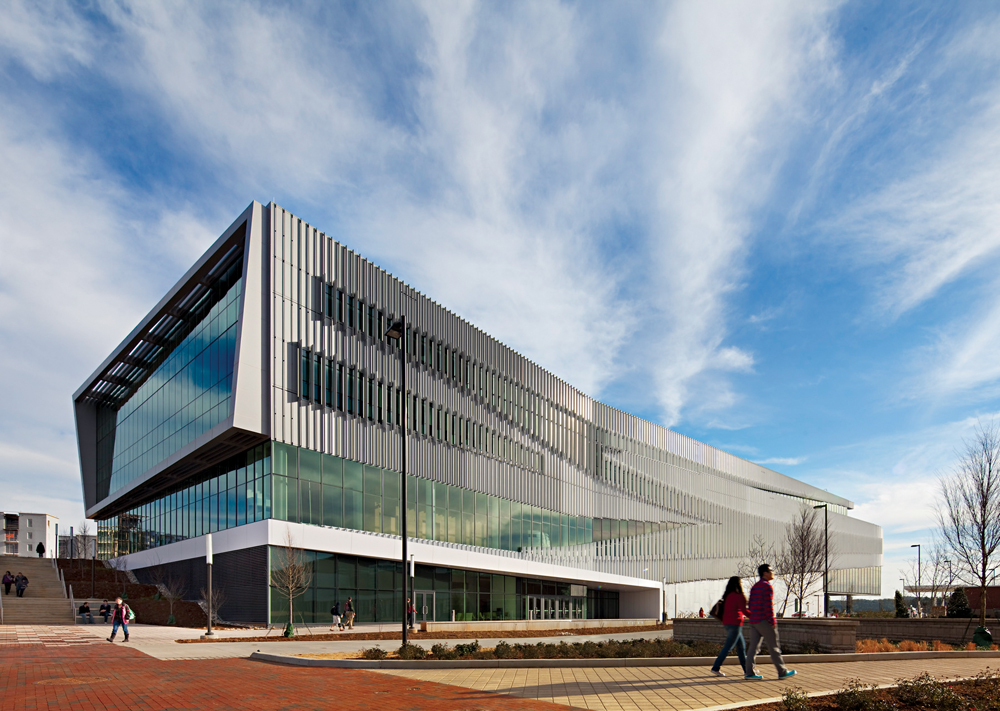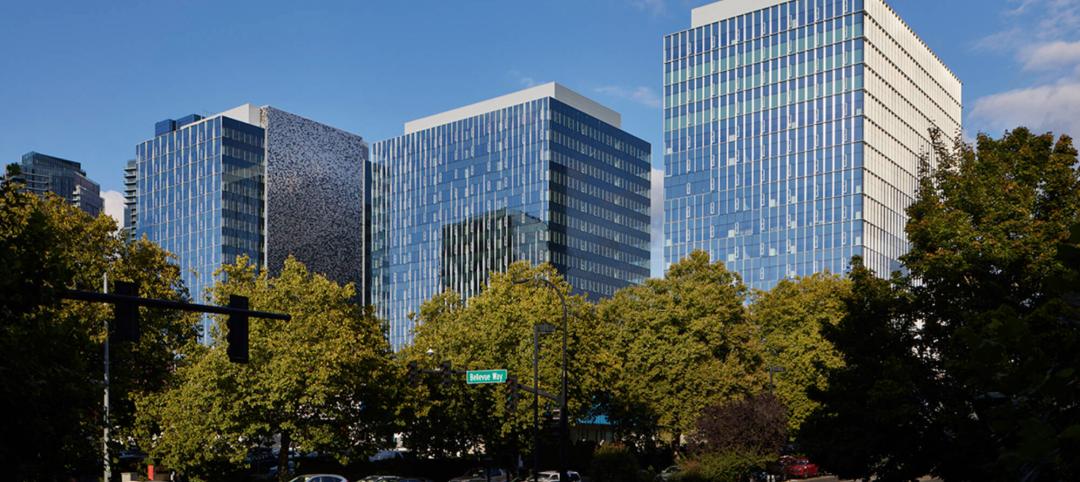Economic recovery has been slow, and the overall higher ed market is still fairly flat, according to a 2013 report by consultant Paul Abramson, using data from Dun and Bradstreet (http://bit.ly/ZiM6cQ).
Nevertheless, better investment performance is improving the mood of donors and easing some of the pressure on endowments. “The market is beginning to open up, with pent-up demand pushing projects to get funded and into design and construction,” says Steve Rhoades, Associate Principal and Client Executive at KJWW Engineering Consultants.
Recruitment pressure has convinced some clients to green-light capital projects. “One of the key drivers of growth is the need for colleges and universities to stay more competitive in amenities: more luxurious dorms, state-of-the-art athletic facilities, technologically advanced classrooms,” says Thomas Goemaat, President and CEO of Shawmut. Goemaat says his firm has seen a “significant and sustained uptick” in academic work in New England and the Tri-State region of New York, New Jersey, and Connecticut.
Large facilities that combine academic and medical objectives are capitalizing on the synergy between education, science, and clinical services. For instance, the University at Buffalo (N.Y.), whose UB2020 master plan has been simmering since 2004, will break ground this fall on its $375 million School of Medicine and Biomedical Sciences Building. At half a million square feet, the HOK-designed facility is the linchpin of UB’s plan to create a whole new Downtown Campus. The city will build a Metro station below the structure, and a children’s hospital (run by the nonprofit Kaleida Health) and privately owned medical office building will rise next door.
TOP UNIVERSITY ARCHITECTURE FIRMS
2012 University Revenue ($)1 Cannon Design $71,000,0002 Perkins+Will $49,726,5433 Stantec $36,704,0774 EYP $30,000,0005 SmithGroupJJR $25,600,0006 Gensler $22,140,0007 IBI Group $21,432,7128 Flad Architects $20,350,0009 Wight & Co. $18,072,20010 Sasaki Associates $16,865,404
TOP UNIVERSITY ENGINEERING FIRMS
2012 University Revenue ($)1 Affiliated Engineers $47,202,0002 URS Corp. $39,211,8523 AECOM Technology Corp. $33,000,0004 Buro Happold Consulting Engineers $28,695,0005 Burns & McDonnell $25,635,0006 STV $21,121,0007 Parsons Brinckerhoff $19,000,0008 Clark Nexsen $18,141,7909 Vanderweil Engineers $15,062,10010 KJWW Engineering Consultants $13,554,873
TOP UNIVERSITY CONSTRUCTION FIRMS
2012 University Revenue ($)1 Whiting-Turner Contracting Co., The $818,113,1402 Turner Corporation, The $701,340,0003 Skanska USA $437,058,2284 Structure Tone $354,907,9005 PCL Construction Enterprises $340,500,0756 Mortenson Construction $246,330,0007 Swinerton Builders $229,439,9508 DPR Construction $227,149,3779 Sundt Construction $225,748,51410 Austin Commercial $225,311,911
The partnership aspects of the UB project illustrate a trend toward creative public/private development. “There is a growing understanding that institutions can no longer afford to function independent of their host community—a change that has been driven in part by growing financial pressures,” says Mike Medici, AIA, Learning Practice Leader at SmithGroupJJR. “This is leading to an increase in community development partnerships as institutions seek to leverage their impact as ‘economic engines.’”
In Camden, N.J., Rowan University is finishing its $139 million Cooper Medical School education building—home of a new med school, the state’s first such project in more than 30 years. The curriculum emphasizes problem-based learning, with academic facilities tailored to group work plus hands-on simulations with robots and even a virtual reality CAVE. The project, designed by HDR, embodies higher ed’s current concern for programs that prepare students for a tough job market.
With thousands of traditional dorms still in use, the need for more modern residences also continues to generate work. Some responses have been dramatic, such as the 21-story Tree House just built by Suffolk Construction at the Massachusetts College of Art and Design, Boston. Amenities of the 493-bed apartment-style facility include a health center, café, and “Pajama Floor” where students can play games, watch TV, study, or work out while doing laundry. Hardin Construction (just acquired by DPR) recently delivered projects comprising nearly 2,000 beds for four academic clients in Georgia—all spurred by a desire to meet “modern consumer expectations,” according to Director of Higher Education Carlos Torres.
In another competitive strategy, some schools are replacing old-style student unions with recreation centers emphasizing wellness. Buildings may include student services offices, clinics, or classrooms for related subjects.
Auburn University at Montgomery (Ala.) positioned its 74,000-sf Wellness Center as a new front door for the entire campus. Constructed by BL Harbert International, the facility includes outdoor fields, two basketball courts, weight and cardio rooms, two multipurpose rooms, an aquatic center with outdoor spa, an indoor track, climbing wall, and juice bar, plus classrooms, lecture halls, and a lab for the Department of Physical Education and Exercise Science.
Finally, the American College & University Presidents’ Climate Commitment, now with 669 signatories, continues to influence construction. Some schools are eyeing net-zero and the Living Building Challenge for a variety of building types. And though central plants may not be glamorous, many clients now recognize the tantalizing ROI offered by improved infrastructure. In an extreme example, Rist-Frost-Shumway engineered a new 15,800-sf wood-biomass heating plant with cogeneration for Colby College in Waterville, Maine—a milestone in the school’s quest for carbon neutrality.
As in other sectors, energy performance of existing buildings is also becoming a high priority for higher ed. “The old piecemeal approach that advocates randomly adding sustainable applications won’t do the trick; more holistic building energy strategies are required,” says Vuk Vujovic, Director of Sustainable Design at Legat Architects.
Read BD+C's full Giants 300 Report
Related Stories
AEC Tech Innovation | Oct 8, 2024
New ABC technology report examines how AI can enhance efficiency, innovation
The latest annual technology report from Associated Builders and Contractors delves into how artificial intelligence can enhance efficiency and innovation in the construction sector. The report includes a resource guide, a case study, insight papers, and an essay concerning applied uses for AI planning, development, and execution.
Healthcare Facilities | Oct 8, 2024
Herzog & de Meuron completes Switzerland’s largest children’s hospital
The new University Children’s Hospital Zurich features 114 rooftop patient rooms designed like wooden cottages with their own roofs. The project also includes a research and teaching facility.
Mixed-Use | Oct 7, 2024
New mixed-use tower by Studio Gang completes first phase of San Francisco waterfront redevelopment
Construction was recently completed on Verde, a new mixed-use tower along the San Francisco waterfront, marking the end of the first phase of the Mission Rock development. Verde is the fourth and final building of phase one of the 28-acre project that will be constructed in several phases guided by design principles developed by a design cohort led by Studio Gang.
Brick and Masonry | Oct 7, 2024
A journey through masonry reclad litigation
This blog post by Walter P Moore's Mallory Buckley, RRO, PE, BECxP + CxA+BE, and Bob Hancock, MBA, JD, of Munsch Hardt Kopf & Harr PC, explains the importance of documentation, correspondence between parties, and supporting the claims for a Plaintiff-party, while facilitating continuous use of the facility, on construction litigation projects.
Glass and Glazing | Oct 7, 2024
Pattern language: An exploration of digital printing on architectural glazing
Architectural Glazing has long been an important expressive tool which, when selected and detailed thoughtfully, can contribute to the successful transformation of architectural concepts to reality.
University Buildings | Oct 4, 2024
Renovations are raising higher education campuses to modern standards
AEC higher ed Giants report working on a variety of building types, from performing arts centers and libraries to business schools. Hybrid learning is seemingly here to stay. And where possible, these projects address wellness and mental health concerns.
AEC Tech | Oct 3, 2024
4 ways AI impacts building design beyond dramatic imagery
Kristen Forward, Design Technology Futures Leader, NBBJ, shows four ways the firm is using AI to generate value for its clients.
Laboratories | Oct 2, 2024
Trends in scientific research environments: Q&A with Flad's Matt McCord
As part of an ongoing series, Matt McCord, AIA, NCARB, LEED AP BD+C, Associate Principal with Flad Architects, discusses the future of the scientific workplace.
Museums | Oct 1, 2024
UT Dallas opens Morphosis-designed Crow Museum of Asian Art
In Richardson, Tex., the University of Texas at Dallas has opened a second location for the Crow Museum of Asian Art—the first of multiple buildings that will be part of a 12-acre cultural district. When completed, the arts and performance complex, called the Edith and Peter O’Donnell Jr. Athenaeum, will include two museums, a performance hall and music building, a grand plaza, and a dedicated parking structure on the Richardson campus.
Data Centers | Oct 1, 2024
10 biggest impacts to the data center market in 2024–2025
While AI sends the data center market into the stratosphere, the sector’s accelerated growth remains impacted by speed-to-market demands, supply chain issues, and design innovation necessities.

















